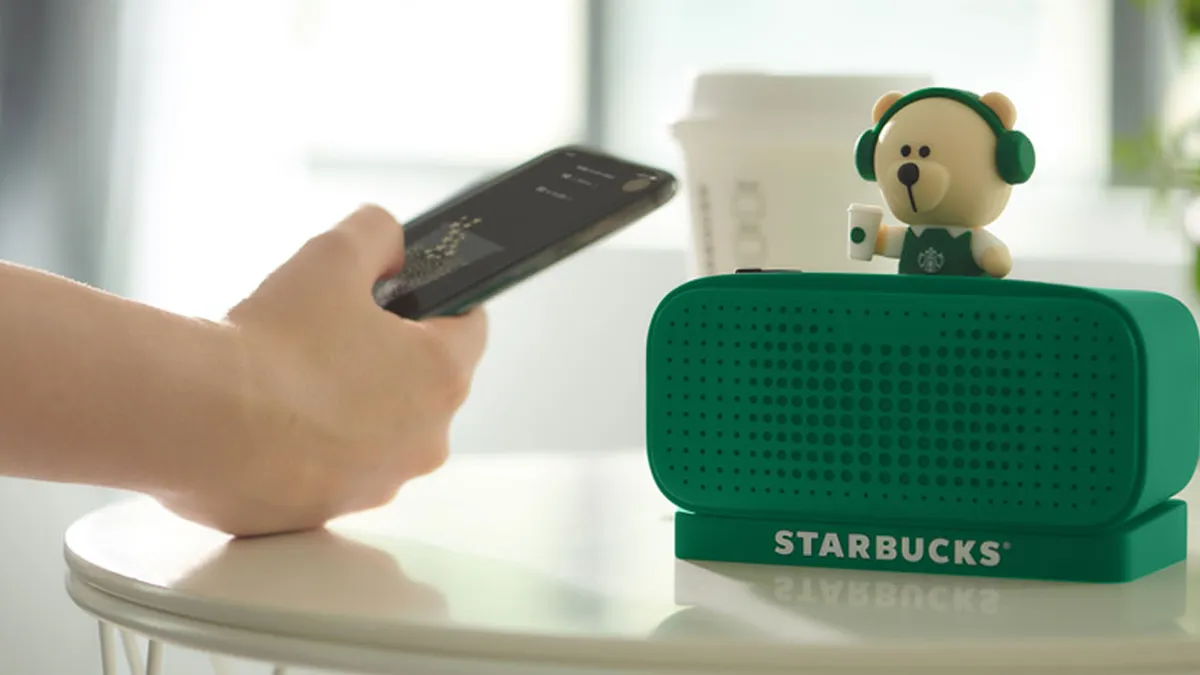Dive Brief:
- Starbucks announced a partnership with Alibaba to launch voice ordering and delivery capabilities in China through Alibaba's smart speaker, Tmall Genie, according to a company release. The launch comes as Starbucks and Alibaba mark one year of their strategic partnership in the China market.
- The new service leverages Alibaba's on-demand food delivery platform Ele.me and artificial intelligence technology through Tmall Genie.
- The Tmall Genie can track orders in real time. Starbucks Rewards members can also earn Stars, listen to Starbucks in-store playlists and receive membership updates, including benefits, through the Tmall Genie.
Dive Insight:
Starbucks first collaborated with China-based Alibaba, one of the world's biggest e-commerce companies, in August 2018. The two companies have since worked on several projects together, including back-of-the-house kitchens within Alibaba's Frehippo supermarkets for delivery orders. Starbucks also launched delivery in the China market last year through Alibaba’s Ele.me.
As tech-savvy rival Luckin aggressively expands in the China market, Starbucks' ability to leverage the tech giant throughout its ecosystem — from back-of-the-house efficiencies to customer facing delivery — should give the U.S. company a leg up.
However, this competition will likely remain intense nonetheless, as Luckin looks to aggressively expand its footprint on the heels of an IPO, and as Chinese consumption for coffee continues to grow at a swift pace. Coffee consumption in China nearly tripled between 2014 and 2018, and coffee imports have grown 16% a year compared to about 2% in the U.S.
With voice ordering in place, Starbucks is taking a big bet on a relatively new technology with big projections to provide an added advantage. Voice commerce sales last year totaled $2.1 billion, according to eMarketer. Consulting firm Capgemini predicts that consumers will use voice technology for 18% of their total spending by 2021 (up from 3% in 2018), according to the Wall Street Journal. In dollar terms, OC&C Strategy Consultants found that about $1.8 billion of voice commerce was conducted in the U.S. in 2017 and forecasts that to rise to $40 billion by 2022.
This isn't Starbucks' first foray into voice tech. In 2017, the company launched Starbucks Reorder Skill through the Amazon Alexa platform, and the My Starbucks Barista chatbot, which enables users to order their favorites using voice commands on the mobile app. Starbucks is also not the only brand dipping into voice. Dunkin' introduced voice activated ordering last year, while Domino's, Pizza Hut, TGI Fridays and Denny's have also added voice capabilities.
For the China launch, however, Starbucks customers will be able to leverage their entire journey through voice, including ordering, paying and tracking their orders, while also gaining rewards and listening to playlists if so desired. And, because this voice ordering system is powered through AI, customers will also soon be able to receive personalized recommendations based on past orders and popular items when they order through the Tmall Genie, according to the release. Such personalization is a big reason so many major brands, McDonald's and Sonic among them, are prioritizing AI technology. Ultimately for Starbucks, it may not be the voice-enabled conveniences that give the company an advantage in the market, but rather this personalization piece expected to come next.









